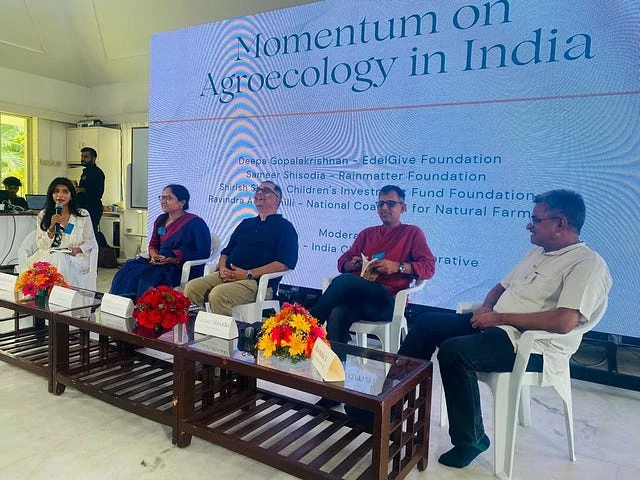We are excited to introduce five innovative climate solutions to be featured on the ICC’s Earth Exponential platform this quarter. These impactful, scalable projects from our partners adopt an integrated approach – they address critical climate action indicators while fostering community health, enhancing livelihoods, reducing waste, and promoting climate-resilient agriculture and agroforestry. Below, we detail the organisation, project name, location, and budget.
ASSIST Development Foundation
SUSTAIN - Sustainable Agricultural Technologies for Improved Livelihoods: A project targeting post-harvest loss reduction using decentralised renewable energy technology in rural Maharashtra and Tamil Nadu.
Project duration: 2 years | Budget: INR 73 lakhs | Solution area: Farms, Jobs
The project aims to:
- Introduce decentralised post-harvest technologies: Deploy solar drying and cold storage systems to address food waste caused by inadequate preservation methods and ensure energy-efficient solutions.
- Enhance agricultural resilience: Extend the shelf life of produce to reduce spoilage, mitigate losses, and support farmers in adapting to climate variability and energy constraints.
- Boost farmers’ incomes and sustainability: Improve marketability and profitability of agricultural products through innovative preservation technologies, fostering long-term economic and environmental sustainability.

Source: ASSIST Development Foundation
Biome Environmental Trust
Water Management in Devanahalli and Hunasamaranahall: An initiative addressing water security in Bengaluru and surrounding areas.
Project duration: 3 years | Budget: INR 1.2 crores | Solution area: Cities, Nature
The project aims to:
- Ensure sustainable water supply: Enhance town water supply through revived shallow aquifers, leveraging recharge from lakes that receive treated wastewater, and by implementing innovative water treatment systems.
- Integrate waste and water management: Prevent water body contamination by managing wastewater and solid waste effectively, ensuring safe reuse in agriculture.
- Enhance rainwater harvesting and project’s replicability: Enhance local rainwater recharge with resident communities, improve hydrological knowledge, and advocate the replication of this model in other towns.

Source: Biome Environmental Trust
Environment Conservation Society (SwitchON Foundation)
Superfood from Farm-to-Fork: A millet farming project in Maharashtra, Odisha, and Jharkhand, focusing on livelihoods and resilience for smallholder farmers.
Project duration: 1.5 years | Budget: INR 1.69 crores | Solution area: Farms, Jobs, Resilience
The project aims to:
- Boost millet production and value addition: Promote sustainable millet farming via community seed banks, training, and renewable energy-based processing infrastructure, to enhance marketability and farmer profits.
- Strengthen market linkages and awareness: Facilitate market access through FPOs, buyer-seller connections, and campaigns to reintroduce millets into community diets.
- Empower communities and build climate resilience: Engage women and youth in the millet value chain and foster climate-resilient agriculture to reduce water dependency and enhance soil health.

Source: Environment Conservation Society (SwitchON Foundation)
Farmers for Forests
Agroforestry Implementation on Farmers’ Land: A tech-driven agroforestry project in Maharashtra and Karnataka leveraging carbon markets.
Project duration: 1 year | Budget: INR 1.21 crores | Solution area: Farms, Nature
The project aims to:
- Restore degraded lands: Transform degraded agricultural land in central Maharashtra into biodiverse landscape by growing native fruit, timber, and ayurvedic tree species, revitalising local ecosystems.
- Promote alternate livelihood opportunities: Create green jobs and sustainable income sources for farmers through mid-term and long-term fruit yields and carbon revenue.
- Develop climate resilience: Strengthen climate resilience by establishing biodiverse forests that can better withstand extreme weather events, thus providing sustainable income sources for agrarian and tribal communities.

Source: Farmers for Forests
Under the Mango Tree Society
Building Climate Resilience through Beekeeping: An initiative promoting indigenous bees and beekeeping for women and smallholder farmers in Adivasi communities in Madhya Pradesh.
Project duration: 3 years | Budget: INR 2.73 crores | Solution area: Jobs, Nature
The project aims to:
- Promote climate-resilient livelihoods: Support tribal communities and smallholder farmers in diversifying incomes through sustainable beekeeping with indigenous bees, enhancing pollination benefits for improved yields and incomes.
- Encourage sustainable agricultural practices: Raise awareness to shift from unsustainable honey hunting to sustainable beekeeping, fostering the conservation and growth of local pollinator populations.
- Enhance green cover and ecosystem health: Distribute bee-friendly seeds and saplings to combat deforestation, improve pollinator habitats, and boost community incomes.

Source: Under the Mango Tree Society
Visit earthexponential.org to learn more about the above solution areas or write to Aditya Mandloi at aditya@indiaclimatecollaborative.org to learn more.

Subscribe to our Newsletter
Join ICC's monthly newsletter and read more about uplifting climate narratives, innovative solutions, and other updates.




